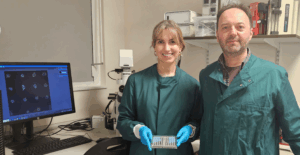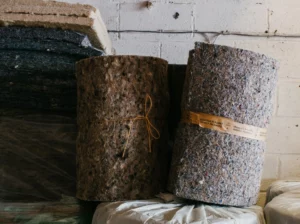Our latest portfolio spotlight is Beta Bugs Limited. We had the pleasure of sitting down with, Thomas Farrugia, their CEO and Founder to delve into Beta Bugs’ background, their future aspirations, and their partnership journey with TRICAPITAL.
Beta Bugs Limited, headquartered in Edinburgh, UK, is an insect genetics company that develops and distributes black soldier fly breeds to the insect farming sector.
The company’s mission is to increase the output of insect farmers through the use of its improved Black Soldier Fly genetics, HiPer-Fly®, which it supplies from its egg production facility, The Multiplier®. This enables the insect farming industry to produce a protein that is competitive on price point against existing feed ingredients.
Can you provide us with an overview of Beta Bugs, shedding light on your core products and services? Additionally, could you share some background on the company?
Beta Bugs is an insect genetics company specialising in developing and distributing breeds of black soldier fly for the insect farming sector. Black soldier flies are a sustainable solution for protein production as their larvae can be grown on food waste and used as a protein source for various animals. By reducing reliance on soy in animal feed, Beta Bugs contributes to lowering greenhouse gas emissions associated with soy production and food waste disposal.Our role in the industry is two-fold:
- We run a selective breeding program to enhance the genetics of black soldier flies. Using our improved genetics allows insect farmers to produce more protein efficiently over time. We supply these improved genetics as eggs or baby larvae to our customers, ranging from food waste companies to farmers and large corporations with agri-food connections.
- We operate a black soldier fly egg production facility in Scotland, producing batches of black soldier fly eggs and five-day-old larvae, which we supply to customers. This approach streamlines the farming process for our customers, saving them time and contributing to the overall efficiency of insect farming.
Our product lines include Just Fly®, offering standard eggs and genetics, and HiPer-Fly, featuring selectively bred larvae (we do this without genetic modification). This dual focus on breeding and manufacturing is what sets us apart in the insect farming industry.
Six years ago, you finished a PhD in chemistry and embarked on a journey into insect genetics. Can you share more about the inception of Beta Bugs and your evolution into the insect farming sector?
After completing my PhD, my interest in insect farming led me to join the Deep Science Ventures company-building program in London. Initially focused on insect farming, we later pivoted to insect genetics upon recognising a gap in the sector. In traditional farming, genetics play a crucial role in increasing yields, and we saw an opportunity to bring this approach to insect farming.The initial years were dedicated to learning, and with the support of the Royal Society of Edinburgh Entrepreneurial Fellowship, we collaborated with the Roslin Institute in Scotland, the centre of excellence in animal genetics. Over time, Beta Bugs evolved, growing from two to 12 employees during lockdown with European and InnovateUK grant funding. We established our black soldier fly egg production facility in 2021, marking a significant milestone in commercialising the business.
Having recently concluded your investment round with TRICAPITAL, could you walk us through Beta Bugs’ journey as a portfolio company of TRICAPITAL, and share your experiences thus far?
TRICAPITAL came into the picture through a recommendation from Scottish Enterprise’ High Growth Ventures team. The process was swift, we were pitching two weeks after initial outreach to Moray and Kathy from the TRICAPITAL team. The focus of the discussions revolved around the manufacturing aspect of our business, a key element for TRICAPITAL.The collaboration with TRICAPITAL not only led to a successful fundraising round but also opened doors to Scottish Enterprise Co-Investment. Their understanding of the manufacturing play and their ability to work collaboratively with other investors stood out. Steve King’s expertise in scaling manufacturing businesses, now serving as an investor director, adds significant value to Beta Bugs.
What factors motivated Beta Bugs to pursue funding from TRICAPITAL, and how do you foresee this decision impacting the company’s future?
The decision to seek funding was driven by the need to scale up our manufacturing capabilities in response to the growing market demand. TRICAPITAL’s quick comprehension of our business model and their emphasis on manufacturing aligned perfectly with our vision. Unlike some other funders, TRICAPITAL expressed genuine interest in exploring the potential of manufacturing, demonstrating a forward-thinking approach that resonated with us.Moving forward, we anticipate TRICAPITAL’s support in planning larger raises, leveraging their collaborative approach to engage with other funders and strengthen our position in the market.
Looking ahead, how do you anticipate the recent funding round impacting Beta Bugs as you progress, both in terms of immediate plans and overall growth?
In the short term, the funds raised will enable us to expand production capacity, further develop our breeding program, and enhance our position as a valuable partner in the supply chain. Our breeding program is a competitive advantage, and with increased production, we aim to meet the rising demand while fostering strong relationships with our customers.Longer term, we envision Beta Bugs becoming a key player in the insect farming space, recognised for our leadership in developing and distributing insect genetics. The focus will remain on building the business to achieve these ambitious goals.
In your experience, what distinguishes TRICAPITAL from other investor groups, and how do you think their support might contribute to the success of Beta Bugs, especially when compared to other investors or funding sources?
TRICAPITAL’s willingness to build syndicates and collaborate with other investors set them apart. This collaborative approach as well as their facilitated access to Scottish Enterprise co-investment, expedited the fundraising process. Looking ahead, their ability to plan and strategise larger raises alongside us, combined with their experience in manufacturing, positions them as valuable partners in Beta Bugs’ growth journey.
What plans do Beta Bugs have in store for 2024 and beyond?
In the near future, our focus is on ramping up production capacity, driving sales, and advancing our breeding programme. Engaging with existing shareholders and planning for the next stage of fundraising will be crucial. The overarching ambition is to establish Beta Bugs as a leader in insect genetics, emphasising enhanced manufacturing capabilities for long-term growth.Given the rapid developments in the UK Agrifood and international food sectors related to insect farming, we anticipate substantial progress.
Lastly, is there any additional information or insights you would like to impart to our readers regarding Beta Bugs’ journey as a funded startup, your collaboration with TRICAPITAL, or noteworthy observations on the broader landscape of startup investing in Scotland?
Becoming a funded startup has brought about positive changes, both internally and externally, driving a faster pace of commercialisation. Investors play a crucial role in shaping the trajectory of the business, and the focus on making the business commercially successful and profitable becomes more pronounced.Observing the startup scene in Scotland, I personally feel there is a need to keep building successful companies and to encourage successfully exited founders to reinvest in the Scottish ecosystem as angel investors and LPs. This level of long-term thinking and collaboration between universities, investors, entrepreneurs and those who have successfully exited companies is what will create a lasting ecosystem in Scotland akin to Silicon Valley.
If you’d like to learn more about Beta Bugs or the world of insect farming, head over to ‘Beta Buzz,’ a publication for the insect farming industry: Beta Buzz










